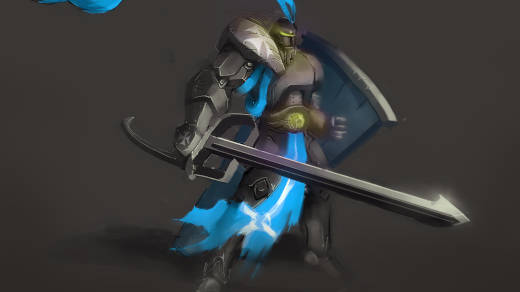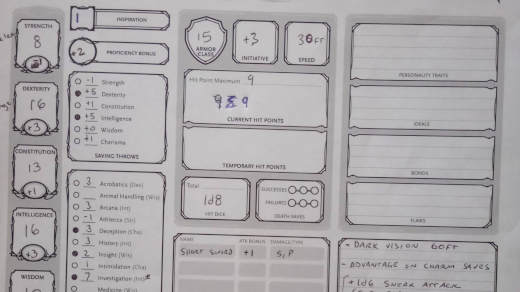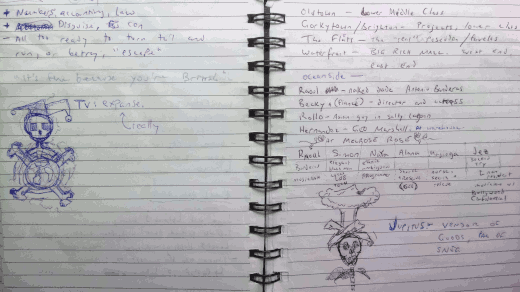A pretty common side effect of gaming is that you don't want to ever stop. Most games, for better or for worse, have a beginning and an end. You start a board game by setting up all the pieces, you play the game, and the game ends when someone wins. A good RPG game, however, doesn't have to stop when you walk away from the table. You can, and arguably should, play a good RPG between sessions, and here's how.

Be a compulsive character builder
I've always thought of building RPG characters as a mini-game within the RPG system, probably because my first introduction to D&D was rolling up characters over lunch break in middle school. Not one of the characters me and my friends built ever got played in an adventure (I wasn't allowed to play D&D due to the infamous "Satanic panic"), but coming up with a new adventurer ever day over lunch was loads of fun. Like the RPG itself, there wasn't exactly a win or lose condition (admittedly, rolling anything less than 18 felt a lot like losing), but the process was fun. We didn't need anything more than the joy of assigning what we rolled to attributes, choosing weapons and equipment, creating a back story, and then throwing out snippets of the adventures in store for our creation.
I do the same thing today. Compulsive character building isn't just fun, it's a great way to learn all the little details of a rule system. If you always play an rogue, then you may never learn about cleric magic systems unless you go to the trouble of building a cleric. Who knows? maybe you'll end up multi-classing.
But suppose you're quite happy playing a rogue in every game. You can only play one rogue at a time, so building a wide variety of rogues inevitably demonstrates the different ways a rogue can manifest itself. It might just give you an idea of how you can play better or level-up more effectively, or you might learn of a new feat you can take.
On top of that, a character you build but never play can serve as an NPC that your actual character encountered whilst adventuring, or a distant relative, or a competitor or a reviled nemesis. Anything you create within one game system can serve as raw material for your actual game, and anything created for another game system is potential material for a future game.

Use alternate realities to improve your leveling
The process of leveling a character is obviously important to a game, and it's one of the best kinds of homework. It's the time you have to bring the game home with you, and the more time and thought you dedicate to it, the better. Simulation is intrinsic to RPG, and just as you experience simulated reality during game play, you can leverage it as part of your decision making process. Don't just level your character once and call it done: get out some spare character sheets and level your character at least three different ways. Review the alternate realities you've just created, consider how they effect your character, and then choose the one you want to actually commit to.
Leveling isn't just min-maxing, though. There are story concerns about the leveling process: how did your character develop the new skills they've just had added to their character sheet? Have they been refining talents by using them frequently, or did they seek out a mentor to learn something completely new? How does your character feel about these new skills? Is this a path they're happy with? or does it frighten them to see what they are becoming, as a response to a life of hardship and adventure?
Spend some time with downtime
Depending on what system you're playing, there may or may not be official rules for what your character does between campaigns. D&D 5e has some rules for downtime in the Player's Handbook (page 187) and in the Dungeon Master's Guide (127-131). Pathfinder's Ultimate Campaign contains a whole chapter on it.
Whether or not your game formalizes downtime, I've never met a GM who doesn't want players to add to their character's story between sessions. Developing a story between campaigns for your character can be fun and rewarding. If your game system has rules for downtime, then those rewards come in the form of XP, crafted items, and gold pieces (did you know that accountants in Pathfinder setting make 3gp a day?), and in any case you get to spend more time in your game world and you get to develop your character.
Downtime activities can play into your choices when leveling your character, too. It might surprise your friends that your thief character multi-classes as a cleric, until you regale them with the downtime story of how the death of a father-figure and mentor changed his outlook on life.

Read up on lore
You know how you can get lost for days just clicking through Wikipedia, reading about people and places and things that you never even knew existed?
You can do that in your game world, too.
Different games have differing amounts of virtual history, so how directly you can learn about your game world depends on the available content. Games like D&D, Pathfinder, DemonWars: Reformation, Shadowrun, Conan, Call of Cthulhu, and Warhammer have so much lore in the form of source books, gazetteers, novels, and video games that it's probably not humanly possible to consume it all, much less remember it. With abundance of detail comes knowledge, and with knowledge comes power, ingenuity, and new ideas. The satisfaction of being able to recognize landmarks when you encounter them in a game is second only to that of being able to stroll into a tavern your gaming group has never visited before, but still being able to greet Durnan by name (as any adventuring Waterdeep citizen would).
Reading up on the lore of your game world is a fun and [virtually] educational endeavour. It benefits you, and it may benefit your character. It's a role-playing game, so there's nothing wrong with having to roll for Knowledge (Local) to determine whether your PC knows something that you, the player, don't know, but it's a automatic crit when you actually do know.
If a library of lore doesn't exist for your game world, you can still mimic a good education by immersing yourself in other fictional worlds like the one you're playing in. Whether you're playing a sci fi game, horror, fantasy, historical urban fantasy, or whatever, there's something out there from which you can draw inspiration. Use what you see and read to help you understand your character's condition, surroundings, and back story.

They don't call it pen-and-paper for nothing
Back stories and downtime and non-played characters don't have to be mere mental exercises. You can write this stuff down. You don't have to write an essay or a novel, if that's not your style. You can fill a page in a notebook with phrases or ideas to reflect your character at each level, or you can sketch or draw something, or just track your character's progress, or create a build tree, or whatever you like.
A dedicated notebook for your gaming can be a great way to extend your game off the table and into your daily life. Get a notebook, and make it your gaming journal. Take it everywhere with. Open it when you get bored, or when you're standing in line or over your lunch break. Spend time with your character and with your adventures. You'll be amazed at what you come up with if you spend a little time thinking about the story being told. It's a little like fan fiction, except your fan fiction is instant canon.
Never. Stop. Gaming.
There are plenty of ways to productively obsess over your games, so find the ways that work for you and bring your game into your daily routine. Don't wait for game night to get your RPG fix.
White castle by ROWALK.RO. Unsplash License.
Templar by killyoverdrive. Creative Commons BY-SA.
Notes by Seth Kenlon. Creative Commons cc0.